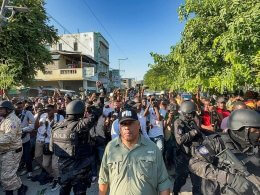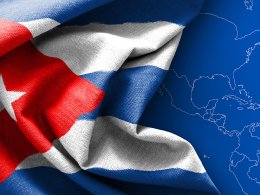Cuba and China have worked out an arrangement that will permit Beijing to set up an electronic eavesdropping facility on the Caribbean island, the next stage of what has been close, but clandestine alliance between the two communist countries, reports the Wall Street Journal.
The Journal’s story comes after many ADN America reports about cooperative efforts between the Castro military dictatorship, China and Russia, including recent cooperative security agreements with Moscow, and two years after a July 29, 2021 ADN Cuba report revealed Chinese paramilitary police specializing in crowd control secretly trained Cuba’s elite Black Beret special forces unit as a means of suppressing Cuban dissidents.
The Journal cited “U.S. officials familiar with highly classified intelligence” as the source for the reports of the new agreement between the two communist countries.
The world renowned newspaper said hosting such an eavesdropping facility in Cuba, only 100 miles from Florida, would enable Beijing’s intelligence services to collect electronic communications from many of the military installations located in the southeast United States and provide a financial band aid to the crippled Castro regime, which is on the brink of financial ruin.
News of the upcoming installation sparked deep concerns in the intelligence community and among Cuba and China experts, who have long warned about Havana’s alliances with Beijing and Moscow.
Citing Admiral Chester W. Nimitz’s warning that the Navy’s function is to “carry the war to the enemy so that it is not fought on U.S. soil,” China-Expert Dr. Rafael Marrero told ADN America that, “Without a doubt, the communist Chinese are picking a fight with us, and they have brought their war against the U.S. to the Florida Strait, to the island of Cuba. They have brought the Indo-Pacific situation to the Caribbean and the Atlantic.”
John Barsa, a former USAID Acting Director and current Executive Director of the Foundation for Human Rights in Cuba said the move marked a new chapter in Cuban hostilities against the U.S.
“Actions always speak louder than words,” Barsa said in a statement sent to the ADN Cuba desk. “Despite the subtleties that may be exchanged in conversations and secret negotiations at the highest levels of government, this new and literally unprecedented military and intelligence threat to the United States should serve as a reminder of the deep-rooted hostility of the Cuban regime towards the United States.”
News of the new spy installation also sparked outrage among Cuban exile leaders, who expressed concern that the Cuban military dictatorship was selling out its own people in exchange for benefits for a few.
“The anti-Cuban regime, in order to stay in power, has a project to sell our island to the Beijing-Moscow Axis, sacrificing the lives and security of Cubans,” Dr. Orlando Gutiérrez-Boronat, coordinator of the Cuban Resistance Assembly (ARC), said to ADN Cuba. I hope that Cuban patriots on the island, wherever they may be, do not lose sight of this reality."
The agreement also raised concerns within the intelligence community because of Cuba’s closeness to the U.S., particularly as tensions rise in the Pacific as Beijing escalates threats against Washington for its naval patrols shielding Taiwan, and after a Chinese spy balloon’s flight over the U.S. earlier this year.
“While I cannot speak to this specific report, we are well aware of, and have spoken many times to, the People’s Republic of China’s efforts to invest in infrastructure around the world that may have military purposes, including in this hemisphere,” National Security Council spokesman John Kirby told the Journal. “We monitor it closely, take steps to counter it, and remain confident that we are able to meet all our security commitments at home, in the region, and around the world.”
U.S. intelligence sources have said the base would most likely focus on SIGINT, otherwise known as “signals intelligence,” to monitor phone calls, emails and satellite transmissions.
News about the upcoming installation also roused criticism from Republicans who have long held the Democratic Party has been too soft on China.
“This month alone, China has harassed & threatened a U.S. fighter jet & naval ship. Now, it’s putting a spy base in Cuba. President Biden is twiddling his thumbs, worrying about China’s green energy policies.
Joe Biden needs to wake up to the real Chinese threats on our doorstep,” Nikki Haley, a former United Nations ambassador, South Carolina governor and current Republican presidential hopeful, wrote on Twitter.
The issue sparked immediate debate on FOX News as hosts Bill Hemmer and former Bush White House official Dana Perino interviewed Gen. Jack Keane, a recipient of the Presidential Medal of Freedom and former Vice Chief of Staff of the U.S. Army who asserted the Democratic Party needs to start viewing Cuba as an “adversary of the United States.”
“We shouldn’t be too surprised, these are two communist countries… they want intimidation of the United States, not just collecting intelligence. We have a base in Cuba, Guantanamo Bay, we really refer to that as a place where we house terrorists, but it is a Navy base, and it has some potential I would imagine once this is in place for us top attempt to put some capability there to counter this to some degree, that’s what my intelligence sources are telling me.”
Shortly after Perino read a Dept. of Defense statement that made clear the Pentagon was aware of the new agreement and they would continue to monitor the situation, she reminded the audience that China was recently attempting to buy farmland in the Midwest that was in close proximity to sensitive U.S. military installations.
“We are Target One for China,” Gen. Keane insisted, “and it’s a comprehensive strategy that they have. You saw it. We had one balloon transit the United States for a week and they we found out there were three other balloons that also penetrated the United States airspace. They’ve established police stations here to intimidate Chinese Americans who don’t agree with their communist policies, and they are conducting the most comprehensive cyber campaign penetrating American society in a way that no other country to include the Soviet Union, has ever done.”
Keane made the point that the Biden administration has been too lax in its policies against Cuba and made an error in reversing some Trump era policies that targeted the communist, military dictatorship.
We’ve got to look at our policy with Cuba. This administration has relaxed the Trump restrictions dealing with Cuba, and I think Cuba has revealed itself who they really are once again. I don’t know how many times we have to find this out… they are an adversary of the United States.”
In the past, the U.S. was aggressive about preemptively preventing enemy powers from asserting intelligence and military capabilities within the Western Hemisphere, most memorably during the 1962 Cuban Missile Crisis.
The U.S. and U.S.S.R. brought the world closer to a potential nuclear war during a game of brinkmanship between President John F. Kennedy and then Soviet Premier Nikita Khrushchev after the Soviets sent nuclear-capable missiles to the communist island, and the U.S. responded by amassing a naval quarantine.
Ultimately, the U.S.S.R. turned its ships around and sent the missiles back to Russia, and several months later the U.S. removed its own intermediate-range ballistic missiles from Turkey that Moscow had repeatedly expressed concerns about.
Since the Obama administration’s Cuban Thaw to ease relations with the United States, Democrats, and particularly the Biden administration have tried to build a bridge between Washington and Havana, reversing some Trump-era policies by easing restrictions on travel to and from Cuba and re-establishing a family reunification program.
The administration also increased consular services, enabling more Cubans to visit the U.S. while reinstating some diplomatic personnel who were removed in the wake of the infamous 2016-17 sonic attacks that afflicted U.S. personnel there with Havana Syndrome.
Earlier this year, ADN America and ADN Cuba revealed that the U.S. Embassy in Havana coordinated a celebration of Black history month with the Cuban regime’s Minister of Interior (MINIT), the same agency responsible for cracking down on Black artists on the island, a move that was condemned by U.S. Sen. Marco Rubio and Afro-Cuban dissidents.
Many in the Cuban exile community have expressed dismay at the Democrats’ approach to Cuba and long for a return to the tougher policies of Presidents John F. Kennedy and Ronald Reagan who allocated significant U.S. resources to combatting Cuba’s attempts to destabilize other Latin American countries with communism and anti-American propaganda.
During its Cold War, the Soviet Union ran a massive overseas SIGINT (signals intelligence) compound near Havana, known as “Lourdes.” The operations center, which closed down in 2002, was used as a central location for hundreds of Cuban and Soviet intelligence operatives. While some speculated the center may reopen since Moscow invaded Crimea in 2014, it has not yet happened.
However, there has been recent traction between the two countries.
ADN recently reported meetings between Cuban regime officials with their Russian counterparts in Havana and Moscow in which the Castro dictatorship offered concessions such as a 30-year land lease to Russia and its business enterprises. Cuban President Miguel Diaz-Canel also met with Xi in Beijing in November.
Just as the Soviets used the Cuban Missile Crisis as a means of demonstrating their own concerns about U.S. capabilities in Eastern Europe, analysts said Beijing may be sending a similar message to Washington about its arms sales to Taiwan, naval ships in the Taiwan Strait and military surveillance flights in the region.
To ease tensions, President Biden is dispatching Secretary of State Antony Blinken is expected to travel to Beijing later this month, in what U.S. officials hope will amount to a discussion with Chinese leader Xi Jinping. The trip, if completed will follow Central Intelligence Agency Director William Burns secret trip to Beijing last month and national security adviser Jake Sullivan’s meeting with a Chinese official in Austria.
An eavesdropping facility in Cuba would make clear “China is prepared to do the same in America’s backyard,” Craig Singleton, a senior fellow at the Foundation for Defense of Democracies told the Journal. “Establishing this facility signals a new, escalatory phase in China’s broader defense strategy. It’s a bit of a game changer,” Singleton said. “The selection of Cuba is also intentionally provocative.”
Currently, Beijing’s only purported foreign military base is in Djibouti, located in the Horn of Africa, but it has expanded its economic reach throughout the world through its Belt and Road Initiative, lending billions of dollars to developing countries to help improve their infrastructure, widen Chinese trade routes and expand the CCP’s global sphere of influence by creating a network of Chinese ports and intelligence bases.
“Some analysts see the project as an unsettling extension of China’s rising power, and as the costs of many of the projects have skyrocketed, opposition has grown in some countries. Meanwhile, the United States shares the concern of some in Asia that the BRI could be a Trojan horse for China-led regional development and military expansion,” according to a Feb. 2, 2023 Council of Foreign Relations online background briefing.
According to a 2018 World Bank report, China had already invested $575 billion in 70 countries at that time. “The BRI presents risks common to many major infrastructure projects: debt risks, governance risks (corruption and procurement), stranded infrastructure, environmental risks and social risks,” the report states.
Most recently, China has attempted to expand its base of foreign relations to Cambodia and U.S. allies such as the United Arab Emirates and even Saudi Arabia.
Barsa said the new spy installation is evidence the U.S. should not consider Cuba a potential ally or even neutral country.
"This, along with Cuba's active participation and support for the Russian invasion of Ukraine, demonstrates that efforts to improve bilateral relations with Cuba are beyond madness,” he said. “The United States and allied governments that also support freedom, democracy, and human rights must treat Cuba as the atypical and pariah state it is and has always been."
Related Story: Pentagon Says Media Reports on China Spy Station in Cuba ‘Not Accurate’









